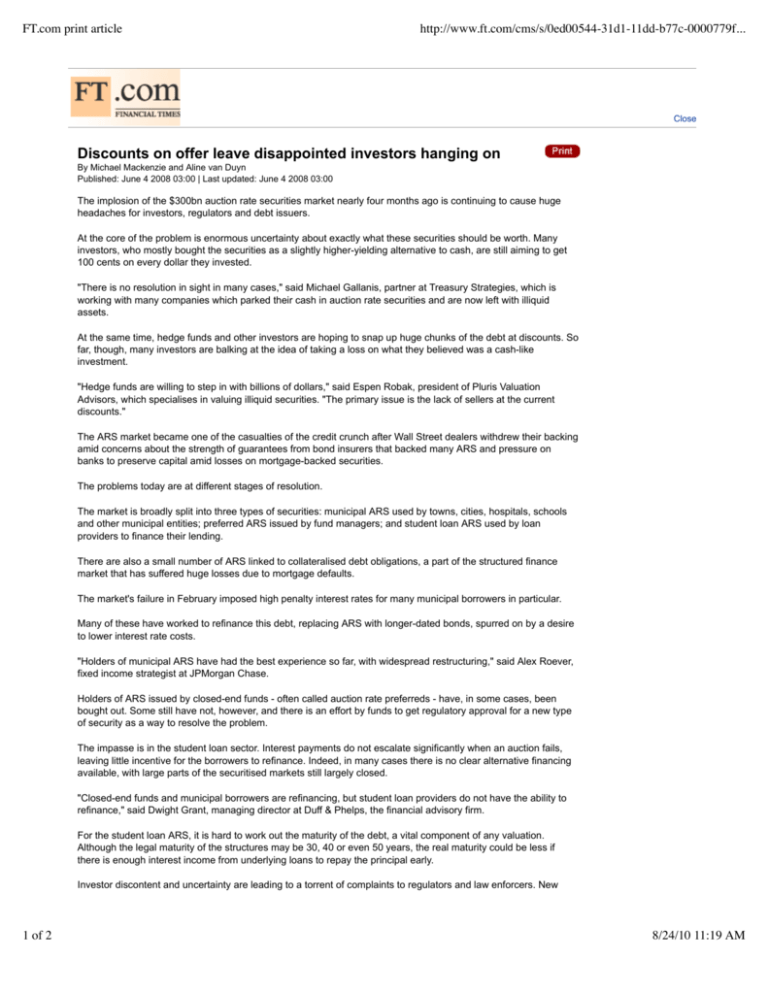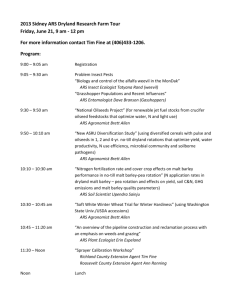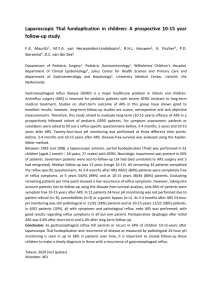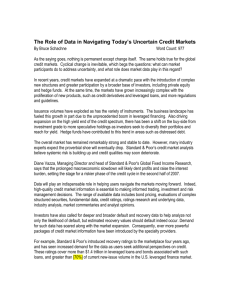Discounts on offer leave disappointed investors hanging on Financial
advertisement

FT.com print article Financial http://www.ft.com/cms/s/0ed00544-31d1-11dd-b77c-0000779f... UK Close Discounts on offer leave disappointed investors hanging on By Michael Mackenzie and Aline van Duyn Published: June 4 2008 03:00 | Last updated: June 4 2008 03:00 The implosion of the $300bn auction rate securities market nearly four months ago is continuing to cause huge headaches for investors, regulators and debt issuers. At the core of the problem is enormous uncertainty about exactly what these securities should be worth. Many investors, who mostly bought the securities as a slightly higher-yielding alternative to cash, are still aiming to get 100 cents on every dollar they invested. "There is no resolution in sight in many cases," said Michael Gallanis, partner at Treasury Strategies, which is working with many companies which parked their cash in auction rate securities and are now left with illiquid assets. At the same time, hedge funds and other investors are hoping to snap up huge chunks of the debt at discounts. So far, though, many investors are balking at the idea of taking a loss on what they believed was a cash-like investment. "Hedge funds are willing to step in with billions of dollars," said Espen Robak, president of Pluris Valuation Advisors, which specialises in valuing illiquid securities. "The primary issue is the lack of sellers at the current discounts." The ARS market became one of the casualties of the credit crunch after Wall Street dealers withdrew their backing amid concerns about the strength of guarantees from bond insurers that backed many ARS and pressure on banks to preserve capital amid losses on mortgage-backed securities. The problems today are at different stages of resolution. The market is broadly split into three types of securities: municipal ARS used by towns, cities, hospitals, schools and other municipal entities; preferred ARS issued by fund managers; and student loan ARS used by loan providers to finance their lending. There are also a small number of ARS linked to collateralised debt obligations, a part of the structured finance market that has suffered huge losses due to mortgage defaults. The market's failure in February imposed high penalty interest rates for many municipal borrowers in particular. Many of these have worked to refinance this debt, replacing ARS with longer-dated bonds, spurred on by a desire to lower interest rate costs. "Holders of municipal ARS have had the best experience so far, with widespread restructuring," said Alex Roever, fixed income strategist at JPMorgan Chase. Holders of ARS issued by closed-end funds - often called auction rate preferreds - have, in some cases, been bought out. Some still have not, however, and there is an effort by funds to get regulatory approval for a new type of security as a way to resolve the problem. The impasse is in the student loan sector. Interest payments do not escalate significantly when an auction fails, leaving little incentive for the borrowers to refinance. Indeed, in many cases there is no clear alternative financing available, with large parts of the securitised markets still largely closed. "Closed-end funds and municipal borrowers are refinancing, but student loan providers do not have the ability to refinance," said Dwight Grant, managing director at Duff & Phelps, the financial advisory firm. For the student loan ARS, it is hard to work out the maturity of the debt, a vital component of any valuation. Although the legal maturity of the structures may be 30, 40 or even 50 years, the real maturity could be less if there is enough interest income from underlying loans to repay the principal early. Investor discontent and uncertainty are leading to a torrent of complaints to regulators and law enforcers. New 1 of 2 8/24/10 11:19 AM FT.com print article http://www.ft.com/cms/s/0ed00544-31d1-11dd-b77c-0000779f... York's attorney-general Andrew Cuomo and others are pressing banks and brokers for information about ARS sales. With some issuers terming out the debt and redeeming ARS at par, plenty of investors are hoping for exactly that treatment, said Mr Grant. Efforts are continuing to find a solution. But some observers believe there will have to be a co-ordinated industry effort, similar to that which recently resolved a liquidity crisis in Canada's asset-backed commercial paper market. "Particularly for the student loan sector, there may be a need for some sort of global co-ordinated effort by the industry or regulators to unfreeze the market," said Mr Roever. Additional reporting by Joanna Chung in New York How auction rate securities work Auction rate securities are regular sales of short-term rolling debt issued by municipalities and other borrowers to fund long- term obligations, writes Michael Mackenzie. Issuers rolled over debt every seven, 28 or 35 days and buyers of the securities, including cash-rich companies and high net worth individuals, received interest rates that were higher than regular cash deposits. When Wall Street dealers stopped supporting the market in February, many auctions failed. While investors in many cases received high penalty rates of interest, they were unable to claim their principal. ARS that are not bought back by issuers remain highly illiquid. Parking space for companies' cash Auction rate securities have become a popular place for companies to park their spare cash, writes Aline van Duyn. Of 395 US companies owning $30bn worth of ARS, 185 have taken a writedown on their investments in the first quarter of 2008, according to research by Pluris Valuation Advisors. The total value of the writedowns was $1.85bn, with the discounts ranging from 57 per cent by Bristol- Myers Squibb to less than 10 per cent at other companies. Many continue to value their ARS investments at par. US companies owning ARS include Google, Texas Instruments and Allstate Corp. Non-US companies also investing in ARS include SAP, the German software company, Adecco the Swiss human resources company and Norwegian oil and gas service provider NOPEC. Copyright The Financial Times Limited 2010. Print a single copy of this article for personal use. Contact us if you wish to print more to distribute to others. "FT" and "Financial Times" are trademarks of the Financial Times. Privacy policy | Terms © Copyright The Financial Times Ltd 2010. 2 of 2 8/24/10 11:19 AM










